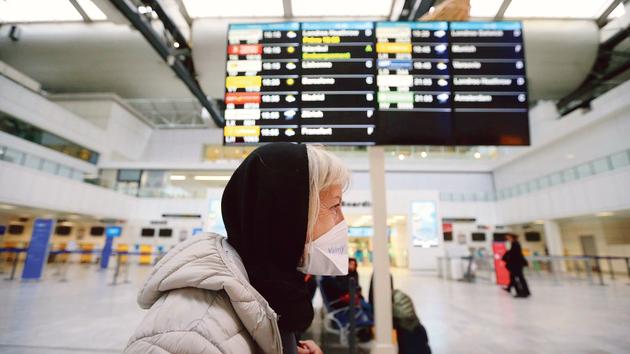On the world map, the red dots are expanding and increasing day by day. They represent the epidemic foci of Sars-CoV-2, the new coronavirus which appeared in China last December. Five new countries were affected on Monday (Afghanistan, Bahrain, Kuwait, Iraq, Oman) and the number of cases has increased sharply in South Korea, Iran and Italy.
While the epidemic is progressing very quickly in our neighbor, should we close our borders to protect France? Tuesday, the Secretary of State for Transport Jean-Baptiste Djebbari assured on BFM Business that it "would not have much interest because the circulation of the virus is not done according to administrative borders" . The European Commission and the World Health Organization (WHO) are of the same opinion, but political figures, like Marine Le Pen and Nicolas Dupont-Aignan, are demanding border controls.
»LIVE - Coronavirus: 2 new cases in France
At first glance, nothing seems more logical: since the coronavirus travels with people, prohibiting movement should, in theory, make it possible to limit its spread. In theory only. Because if this measure has been used with some success in the past (in the 14th century, the city of Dubrovnik, in Croatia, imposed 40 days of quarantine on boats to deal with the black plague), recent studies and models show that it no longer works.
"In our globalized era, closing borders and banning travel is no longer as effective as it once was ," said Michelle Mittelstadt, director of communications at the Migration Policy Institute, an American think tank. Today there are billions of trips around the world and, as the case of Italy shows, the virus is moving faster than the borders can close. ” Italy was one of the first countries - along with the United States, Russia, Japan and Australia - to restrict trade with China. And that didn't stop the coronavirus from reaching it.
Now that the virus has escaped from its Chinese “cradle”, closing the borders seems even more unnecessary. "It could slow its spread by a few weeks, as has been shown in previous epidemics, such as H1N1, but it will not be enough to stop it," said Dr. Isaac Bogoch, an infectious disease specialist at the Toronto hospital. . And to add: "Restrictions or not, people always find a way to get to their destination."
Closing the borders would be a very effective solution if we were able to cut 100% of the connections, which is not possible.
Emanuele Massaro, researcher at the Federal Polytechnic School of LausanneThe only possible exception, the islands, where it would be a little easier to control the comings and goings. "The border closure has already proven its worth for the islands during the influenza epidemic of 1918," recalls Professor Nick Wilson, director of a research program in epidemiology at the University of Otago (New Zealand) ). Without completely blocking the arrival of the virus, “this could give island countries more time to prepare. I think that the position of WHO is not sufficiently nuanced. ”
Read also: Coronavirus: feverish atmosphere on the Riviera, on each side of the border
For the rest of the world, “closing the borders would be a very effective solution if we were able to cut 100% of the connections, which is not possible , analyzes Emanuele Massaro, researcher at the Swiss Federal Institute of Technology in Lausanne. And even if we did that, the socio-economic functioning of our societies would collapse. ” An impossible scenario. Besides, such measures could do more harm than good. "This could hinder the flow of medical supplies and personnel and, in some cases, cause people to hide their starting point , " adds Michelle Mittelstadt.
So, what to do? "We must follow international recommendations, scientific advice, continue to identify and isolate cases," says Emanuele Massaro, pragmatic. But “faced with the threat of a pandemic, governments are under pressure. They must appear to be taking strong action to protect their citizens, or else they will pay the price, "said Mara Pillinger, a public health researcher at the O'Neill Institute in Washington in Foreign Policy . Who will give in to the sirens of the barricades?

